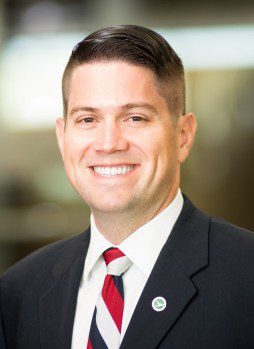Ohio DOT’s Gilmore Named Vice Chair of AASHTO’s CRUO Committee

Drew Gilmore, administrator of the Office of Real Estate within the Ohio Department of Transportation, was recently appointed vice chair of the American Association of State Highway and Transportation Officials’ Committee on Right-of-Way, Utilities, and Outdoor Advertising Controls or CRUO.
It is a committee tasked with reviewing and recommends changes to laws, rules, regulations, and procedures affecting right of way, utility, and outdoor advertising issues, as well as maintaining three AASHTO publications on those subjects.
Gilmore – who will be the CRUO committee’s acting chair until one can be appointed – explained in a phone interview with the AASHTO Journal that “one of the hottest questions every state DOT is facing is longitudal access for fiber installation” along and under roadways.
“That’s a super-hot issue right now; how do we manage it, what do we need to change to make the process more efficient, and what do we – the state DOTs – get for helping with it,” he said. “Several states have this figured out, such as Virginia and Utah. But everyone has to deal with it, so we want to learn from each other what is possible. What can we do with shared resource agreements, for example? However, every state has a different statutory framework, so there are state-specific challenges we need to navigate.”
Gilmore, who will serve a two-year term as the CRUO committee’s vice chair, added that figuring out ways to accommodate the needs of utilities in relation to right-of-way usage – to “control what we can control and what we can design” – is a “national question” he hopes to focus on during his committee leadership tenure.
“Accommodating utilities in the right-of-way is a big, big concern. They are in the same project ‘box’ as we are; we can as state DOTs do what we need to do, maybe at the same time as the utilities, so we can get projects out the door quicker,” he explained. “Maybe that involves thinking about things differently or developing new laws and new policies. Those are just some of the things we’ll be looking at.”


